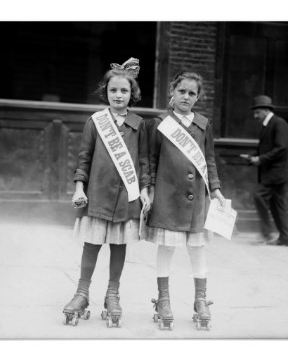 —Jessica K. Taft
—Jessica K. Taft
There is a poster on the wall of my office that reminds me of the long history of girls’ activism. The image is of two girls, wearing roller skates and sashes that proclaim “don’t be a scab.” They have pamphlets in their hands and bows in their hair. Taken during the 1916 New York City street car strike, this photograph speaks to the fact that girl activists have been participating in social movements for quite some time, and that they have been involved in a wide variety of struggles.
The girl activists I wrote about in Rebel Girls do not just address what we might think of as ‘girls’ issues,’ such as teens’ reproductive rights, access to education, or body politics. Like the girls in this early photograph, today’s girl activists in North and South America also fight for labor rights, economic justice, racial equality, environmental sustainability, peace, human rights, and indigenous sovereignty. Girls’ lives, and therefore girls’ politics, are not just defined by their “girl-ness” but are also shaped by their different experiences with neoliberal globalization, political repression, poverty, racism, militarism, and heterosexism.
From my perspective, an analysis of the multiple historical and social contexts of girls’ lives and girls’ activism is what is most notably missing from the current popular celebrations of girls’ capacities to “change the world” (i.e. The Girl Effect and Girl Rising). As girls become increasingly visible figures in discourses on development and economic growth, we desperately need to understand how girls are impacted by the structures of global capitalism and the histories of colonialism and imperialism (not just by local iterations of gender inequality). And, as girls are praised for their individual strengths and their capacity to overcome adversity, we need to learn about the ways they have collectively resisted these forces as participants in social movements.
I too believe that girls can change the world. However, I see this happening not just through individualized economic and educational empowerment but through collective activist projects. Women’s History Month—and the public discourse on girls as agents of change—should not just applaud individual girls and their educational achievements, but should acknowledge the many generations of girls who have strapped on their roller skates, taken to the streets, and worked together to stand up for social and economic justice.
Jessica K. Taft is assistant professor of sociology at Davidson College and is the author of Rebel Girls: Youth Activism and Social Change Across the Americas (NYU Press, 2010).
